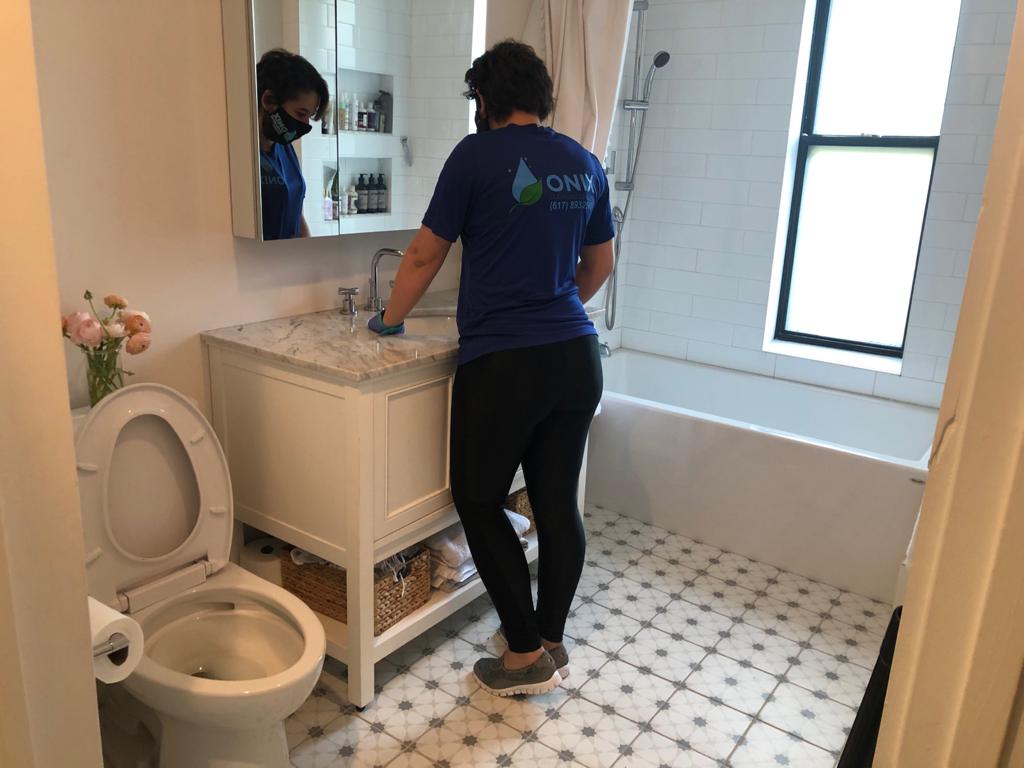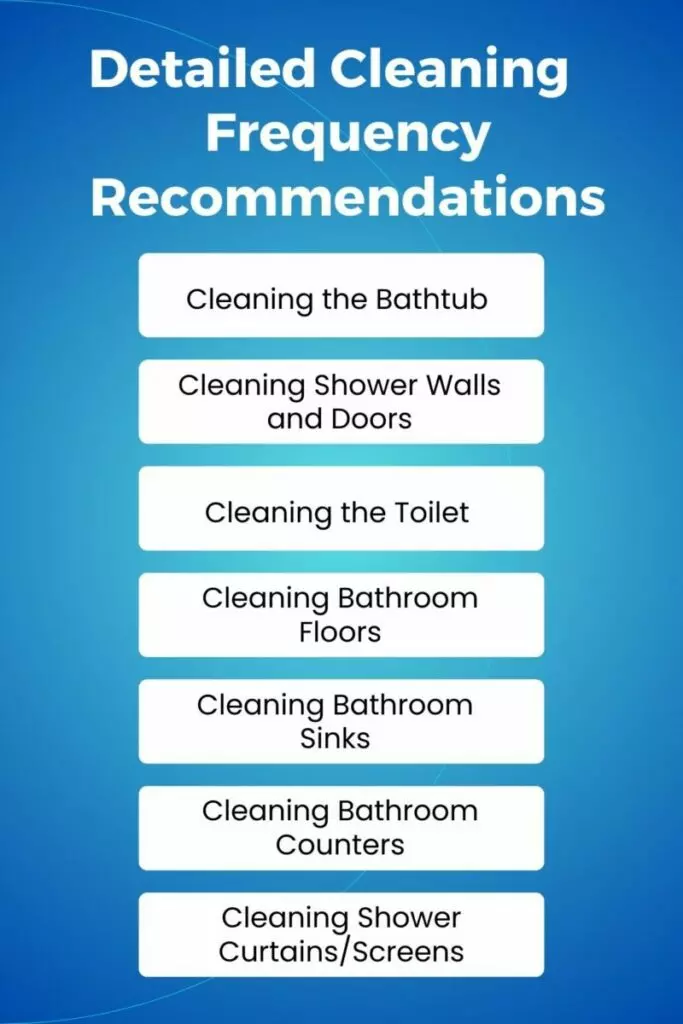Your Guide to How and How Often You Should Clean Your Bathroom

Have you ever wondered, “How often should you clean your bathroom?” Not sure if you need to do routine bathroom cleaning? Wondering why bathrooms need to be cleaned regularly in the first place?
Your bathroom is an area of the house you regularly use that frequently becomes humid and wet. These conditions are perfect for harboring bacteria, bad smells, and mold growth that can cause illnesses if not removed.
We’ll give you specific instructions on how and how often you should clean each area of your bathroom, the benefits of keeping the area clean, and expert opinions and tips.
How Often Should You Clean Your Bathroom?
Answers to the question “How often should you clean your bathroom?” tend to vary, especially because different parts of your bathroom will require different cleaning frequencies.
Overview
As a rule, you should clean your bathroom at least once a week. This frequency keeps most smells and bacteria from sticking to the surfaces in the room.
The thing to remember when giving your bathroom a deep clean is to do it regularly. Your health and nose will thank you for maintaining a tidy and good-smelling bathroom in the long run.
Factors Influencing Bathroom Cleaning Frequency
There are other factors you need to consider when deciding how often to clean your bathroom, such as how many people use the facilities and how often it’s used.
- Number of people in your household using it (especially the toilet)
- Frequency of use
- How quickly towels and mats get dirty
- Temperature and humidity of the climate
- How clean do you want the bathroom to be
Detailed Cleaning Frequency Recommendations
Depending on the part or space in the bathroom you plan to clean, you’ll want to do it at different frequencies. This is because one surface can attract more mildew, mold, and smells than another.

- Cleaning the Bathtub: The bathtub needs to be cleaned once a week because it’s one of the constantly wet and humid areas. You’ll want to prevent mildew and molds from forming in the tub. An all-purpose cleaner should do the trick, but use a vinegar solution and flush it with boiling water if you want to clean the tub drain as well. Check out the detailed steps for bathtub cleaning here.
- Cleaning Shower Walls and Doors: Similar to the tub, you’ll want to clean your shower walls and doors once a week. Use the same methods and materials to maintain the cleanliness of glass shower doors and walls. To clear the water, use a squeegee and a fabric cloth to ensure they’re completely dry after cleaning.
- Cleaning the Toilet: You should also clean the toilet bowl once a week. The proper method to clean a toilet starts with using a toilet bowl cleaner. However, you don’t need toilet bowl cleaner on everything because you can wipe the other surfaces with a bleach wipe. Don’t throw it into the toilet afterward, or you might clog it.
- Cleaning Bathroom Floors: You should sweep the bathroom floor once a week and clean up messes as they happen. You don’t need to mop the bathroom floor every week, but every 2-3 weeks depending on how dirty it gets. For fabric bath mats, throw them in the wash with hot water every week or two, depending on how dirty they get.
- Cleaning Bathroom Sinks: Clean the bathroom sink once a week, too. Use a sponge and start scrubbing the sink with an all-purpose cleaner. If toothpaste stains or soap scum are stubborn, fill the sink with hot water and let it soak for a while before scrubbing. To clean the mirror, use a vinegar solution and a microfiber cloth to wipe the glass down. Only clean the mirror if it gets dirty. Read this detailed guide on cleaning bathroom sinks if you want a better clean.
- Cleaning Bathroom Counters: Clean the bathroom counter once every week or every two weeks, depending on how dirty it gets. Use the microfiber cloth and a general-purpose cleaner for cleaning surfaces like this.
- Cleaning Shower Curtains/ Screens: A fabric shower curtain should be washed with warm water every few months, while a plastic one should be replaced entirely if it shows mildew or dirt.
Effects of Cleaning Frequency on Bacteria and Germs
When you mop, clean, brush, rinse, flush, wash, or wipe a space in your bathroom, it affects how germs, dirt, dust, mold, and other unwanted pollutants will stick to it.
The more proactive you are, the more hygienic and safer your bathroom will be.
Role of Regular Cleaning in Bacteria Control
Most all-purpose or general-purpose cleaner solutions are advertised as having antibacterial properties. This means you can kill pesky organisms using the cleaner solution on a bathroom surface.
For example, if you simply wipe a toilet bowl with toilet paper, you won’t be able to get the dirt and microbes out, meaning there’s still a risk of getting infected with viruses and pathogens.
When you clean the bathroom at least once a week using the proper cleaner or agents like vinegar, baking soda, soap, or other anti-bacterial solutions, you will be able to reduce that risk significantly.
Impact of Cleaning Frequency on Germ Maintenance
Similar to the effects of anti-bacterial solvents and solutions, these general-purpose cleaner solutions also have anti-germ properties. This removes most germs that live on bathroom surfaces.
As long as you regularly wash, clean, brush, or wipe surfaces like the bathroom mirror glass, the floor, bath mats, shower curtain, sink, and toilet, you can reduce the chances of germs sticking to them.
Guidelines for Shower Cleaning
You’ll want to keep these guidelines in mind once you’ve decided to clean your bathroom at least once a week. They’ll help you better clean your shower parts like the shower head, drain, and tiles.
Selecting Cleaning Products for Shower
You’ll want to choose the most appropriate cleaner solution and equipment for each part of the shower. For less common items like a fabric shower curtain, you’ll want to clean it once a month with hot water.
On the other hand, plastic shower curtains cannot be cleaned even if you do a deep clean. You need to replace it because the dirt and germs have permeated the surface.
Cleaning Shower Head
In maintaining a clean shower head, you should use a spray bottle with a cleaner of your choice. This will help it get into the holes where the water comes out.
For wiping the surface of the head, you’ll want to use a brush to wipe the surface of the head. This will help you wipe out any calcified soap scum without having to wash and wipe too hard.
Cleaning Shower Drains
If water won’t sink down the shower drain the way it should, the drain may be partially blocked. To help relieve pressure, you should use baking soda, vinegar, and hot water to unclog the pipes.
Cleaning Shower Tiles
If your shower or bath floor is made out of tiles, you’ll want to wipe it using a brush and a general-purpose cleaner that’s different from the one you use to clean the toilet. You’ll want to do this to avoid cross-contamination.
Expert Opinions on Bathroom Cleaning
You’ll also want to hear what experts have to say when it comes to how often should you clean the bathroom and more. These are tips people working in the industry have learned through experience and study.
Professional Tips from Onix Cleaning
- If you just removed your bath towels or hand towels from the laundry and want to disinfect further, leave them out for a few hours to remove even more germs.
- When wiping, don’t wipe one way and then go back the same way. Instead, lift the cloth and start the motion again to avoid contaminating the already cleaned area.
- The underside of the sink or toilet bowl doesn’t need to be cleaned every week. It should be done once a month or if you notice dirt.
- Toothpaste stains in the sink can be removed using warm water and vinegar. The same stains can be removed from the mirror using the same method.
- Wash your towels once a week too. Grime and microbes can grow on a damp towel. For more disinfecting powers, dry your towel in the sun.
Frequently Asked Questions
You might have other related questions after learning more about cleaning your bathroom and how often you should do it. We’ve answered the most common ones.
What Happens if You Do Not Clean Your Bathroom Frequently?
Dirt, grime, and other unwanted pathogens will invade parts of your bathroom, especially areas that are used often. Examples include the sink, toilet, and shower.
Is Once a Month Enough to Clean a Bathroom?
For some parts of the bathroom, once a month is enough, especially if you don’t use them a lot. However, you’ll want to clean the sink, bath, and toilet at least once a week.
How Often Should You Clean a Seldom-Used Bathroom?
Once every two weeks is a good rule to follow for a bathroom you don’t use often. However, monitor if some parts start to show signs of mold.
What Are Some Recommended Bathroom Cleaning Products?
General-purpose cleaners are appropriate, especially those labeled as made for bathrooms. Here’s a list of recommended bathroom cleaning products.
What Is the Best Strategy for Keeping a Bathroom Clean on a Daily Basis?
The best strategy for keeping your bathrooms ready for daily use is to clean up as soon as you see a mess. This prevents it from sticking to the sink, floor, or tub and accumulating over time.
Conclusion
Cleaning your bathroom often prevents the need for you to do a deep cleaning through every square inch every so often. You avoid a lot of gross grime and fend off microbes that can cause disease.
Cleaning once a week is ideal because it allows you to disinfect those areas, keeping them looking fresh, new, disease free, and smelling good. Who doesn’t want a good-looking and smelling bathroom?
As long as you listen to our tips on adequately cleaning bathroom areas like the toilet, sink, mirror glass, and shower/tub, you’ll have a squeaky clean bathroom in no time.
Written by
Maria DeSouza

Maria De Souza is a committed and accomplished entrepreneur in the cleaning industry, possessing an extraordinary blend of leadership, vision, and knowledge. As the proud owner of Onix Cleaning Services in Boston, Massachusetts, Maria has over two decades of experience in the industry, delivering unparalleled service and maintaining the highest standards of cleanliness.

